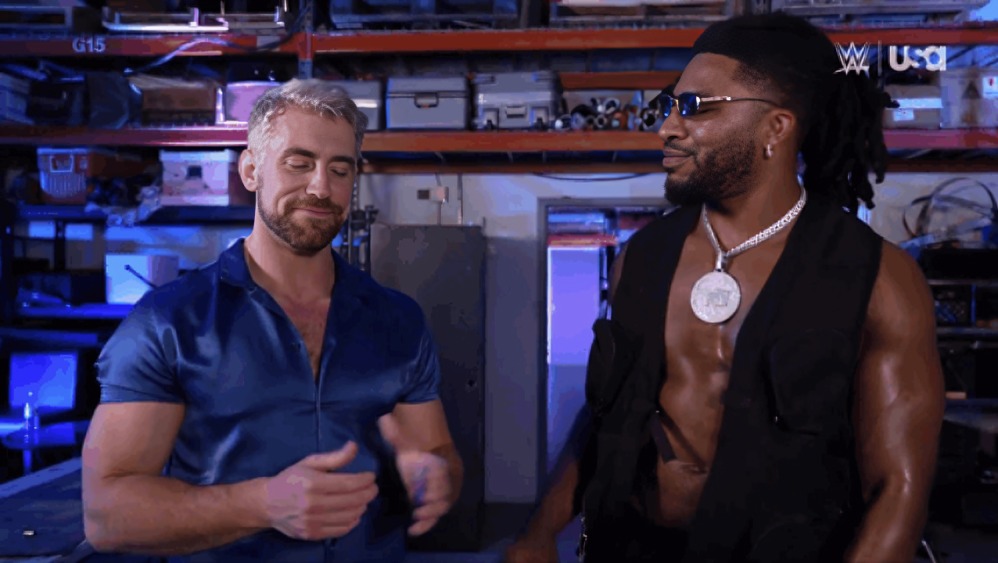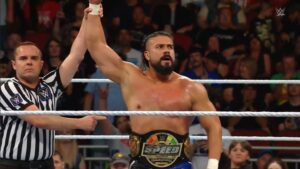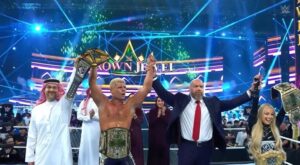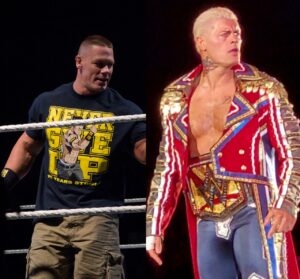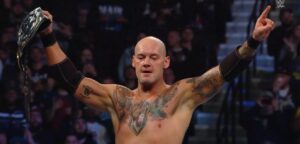This is a continuation of a previous article, “Hit My Music: The Power of Wrestling Themes (Part One)“. It involved Ivan Pavlov and the origins of wrestling music. Please check it out before reading further. As discussed in Part One, I discussed music’s bond with wrestling and its further connection to fans.
Licensed music
Be it recurring or a one-shot, third-party music beyond in-house composers brings layers to characters outside of promos and style.
Consistency
Fans find these types of entrances in wrestlers’ weekly appearances. In effect, fans shape wrestlers through every rhythm and lyric. Take former WWE superstar Batista’s “I Walk Alone,” performed by Saliva.
Adrenaline and testosterone incarnate, it riled the fans up as the Guardians of the Galaxy star excited them. He owned the song, as his fireworks blasted behind him, echoing through the arena like bombs. Fans then attributed a song heard on hard rock stations to Batista bombs.
The most prominent example of this in modern wrestling exists in All Elite Wrestling’s denim-clad babyface Orange Cassidy. Specifically, it exists in the dual usage of “Jane” by Jefferson Starship and “Where is My Mind?” by The Pixies. As with Batista and Saliva, I now associate those songs with Orange Cassidy.
Music rights may be difficult to work around, but once acquired, fans associate popular songs with wrestlers who use them. Limp Bizkit with The Undertaker, Baltimora with Jack Perry’s Jungle Boy, and Action Bronson with HOOK further exemplify this.
One-Shots
One-offs, however, present something differently. These are story enhancers, adding tiny wrinkles that add subtle context to the plotline of the angles. If not that, then it illuminates a wrestler’s state of mind.
Sure, there may be excitement in the air… But look beneath the message in the lyrics or the tones of the instruments. There’s a subtext there that illustrates something inherently deeper.
My favorite example of this is “Hangman” Adam Page’s use of The Outlaws’s Southern Rock cover of “Ghost Riders in the Sky” at Revolution 2023 against Jon Moxley. A cowboy who saw his share of bloodshed. A man, living and dying by the wounds of wrestling.
This collision foretold how indulgences in these matches would set Page on a dark path. A cool moment, foretelling his misery.
Nostalgia pops
When strategically planned, nostalgia rewards fans for loyalty and attention. Through callbacks, past catchphrases, and old signature finishers, fans see the full circle in which life moves.
Here you are, watching them walk the aisle and be their trademarked self as you remember them. The song never changes, reminding you of what came before.
The moments in their careers, and the memories of this period in your life. It’s special.
Echoes through time, pulling at vulnerable states of who you were. Waves of puddles splashed, each reflection of what life was like, seemingly simplified compared to your current problems. It calls to you from a place you can’t return.
That’s why Seth Rollins’ sneaky arrival in the main event of WrestleMania 40 Night 2 left fans abuzz with The Shield’s music blaring in Philadelphia. Fans reminisced on the days of triple-powerbombs as Roman Reigns stared at a reminder of his stained past in the eyes.
This is one of wrestling’s rare magics: simultaneously transporting fans back to the past while keeping them in the present.
Wrestlers Who Are Musicians
Did you ever wonder if certain wrestlers sang their own theme songs? For some, that’s very much the case. We know of John Cena’s iconic “My Time is Now”.
We’ve groaned at Fozzy playing frontman Chris Jericho to the ring. Mickie James, the Honky Tonk Man, and Shawn Michaels also share this. Their signature voices combine what we know of wrestlers with their musical aspirations or character based upon it.
This is primarily in two popular contemporary talents: Joe Hendry and Swerve Strickland. For the former, Hendry has utilized his lyrical prowess to connect to audiences through hilarity and parody. Meanwhile, Strickland’s legitimate hip-hop background completes his style.
Encouraged to pursue their extracurricular endeavors, both men have seen a crossover to broader markets without WWE. After “I Believe in Joe Hendry” already made the Scottish wrestler a household name, WWE started flaunting him on NXT in their ongoing collaboration with TNA Wrestling. Strickland, however, recruits colleagues in the hip-hop space including Rick Ross, Tech N9ne, DJ Whoo Kid, and Fabolous.
Coincidentally, there is a reverse to this. WWE’s working relationship with Bad Bunny further connects that bridge. From WrestleMania 37 to Backlash, the Puerto Rican musician’s love for wrestling and music coagulate, drawing fans to the wrestling-music connection.
Using Music as Storytelling
This is an interesting case, but one I love. I’ve long since been a fan of Bray Wyatt, dating before I returned to full-time wrestling fandom.
His cadence in promos was unlike that of others performing in WWE at the time. The imagination that accompanied him dangled in front of fans, veering into uncanny valleys while being uncomfortably relatable.
Whether he hailed from the swamps or the Firefly Funhouse, his unsettling but human nature captivated audiences. Then in 2021, WWE released him.
Bray Wyatt
In 2022, Wyatt returned to the WWE with a new character change. This persona featured a humble, human, realistic Bray Wyatt, reflecting the Windham Rotunda underneath. He bled his heart out to fans for saving his life and giving him purpose.
He reached out, feeling what fans felt for him. In his storyline, Uncle Howdy haunted him. Portrayed by his brother, Bo Dallas (aka Taylor Rotunda), he stood ominously in the background.
Wyatt’s theme song, “Shatter” by Code Orange, added much to the presentation. Everything he had been through was layered with depth and symbolism in each verse. Tragically, he passed away in August 2023.
Wyatt never saw his vision through. But hope remained. Uncle Howdy, the inevitable bringer of closure, was still there.
The Wyatt Sicks
That thread soon unraveled, as WWE aired cryptic vignettes and QR codes. It continued until June 17, 2024, when an episode of Monday Night Raw seemingly ended after a main event match. That’s when the terror started.
Through a single-shot sequence of human manifestations of Firefly Funhouse characters, a piano note was ringing. Looping, building to a song that never comes. Notes removed from existence.
When the Wyatt Sicks ultimately clashed with Chad Gable and the Creed Brothers (aka American Made) on August 5, the music played. The note started as usual as Dexter Lumis, Joe Gacy, and Erik Rowan crept to the ring. Then, it went out of tune familiarly.
It grew and grew and grew. It grew until Code Orange’s beats, rhythms, and vocals finally flew in the air to rage with the fireflies. For this moment, Wyatt was present in each lyric, joining his fiendish fireflies in the ring.
He’s here. Run.
I enjoyed this build to what was ultimately a subtle, small thing. This was when I knew that the creeping suspension of a song reflected the song, “the little details matter.” The storytelling was in the music.
With this anticipation in mind, I waited that summer, a dog salivating for his next treat, knowing it would come. It did. Pavlovian conditioning.
Conclusion
I’ve used Pavlov in past articles, as behavioral, situational, and social psychology are my jams. Combining it with music and wrestling proved an interesting research and discussion.
How fans react to music in wrestling rests on anticipation which in turn creates an atmosphere. It adds aura and sensation, leaving an indefinable impact on viewers. Among the many spinning wheels that power wrestling, music plays a significant role.
Music’s direct response to the endorphins inherent in humans further connects them to a specific point in time. Whenever music strikes, humans react to its familiarity.
All one has to do is listen.
More From LWOS Pro Wrestling
Header photo – WWE – Stay tuned to the Last Word on Pro Wrestling for more on this and other stories from around the world of wrestling as they develop. You can always count on LWOPW to be on top of the major news in the wrestling world, as well as to provide you with analysis, previews, videos, interviews, and editorials on the wrestling world. You can check out an almost unlimited array of WWE content on the WWE Network and Peacock.


